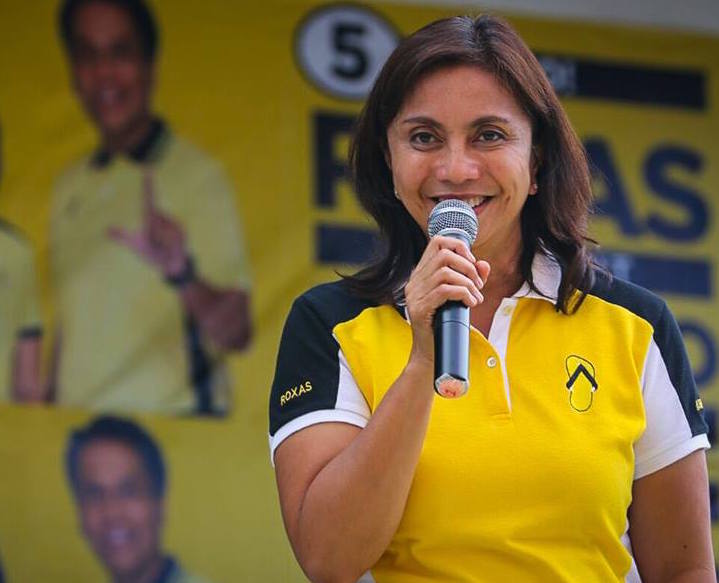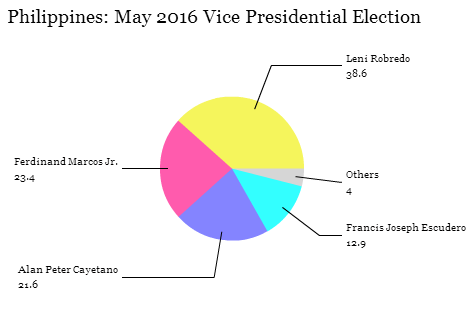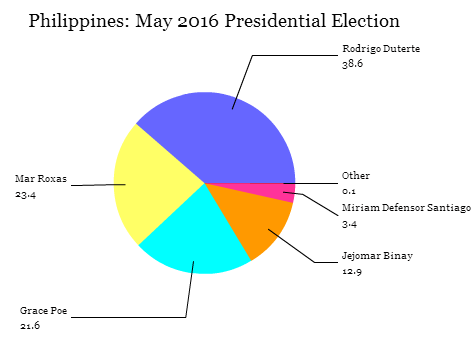
For a country that just elected a foul-mouthed, tough-talking and controversial strongman to the presidency, it was easy enough to believe that same electorate would also choose a similar strongman as vice president.![]()
As returns come in from the May 9 general election in the Philippines, voters have delivered Rodrigo Duterte a strong victory in the race to become their next president. But they also seem to have had last-minute doubts about handing the vice presidency to Ferdinand ‘BongBong’ Marcos, Jr.
* * * * *
RELATED: Philippines considers both
presidential strongman, Marcos restoration
* * * * *
Instead, defying polls throughout the campaign that gave Marcos a slight lead, the narrow winner (for now) is Maria Leonor ‘Leni’ Robredo, the candidate of the Partido Liberal ng Pilipinas (Liberal Party), which has governed the world’s 12th-most populous country for the last six years under Benigno ‘NoyNoy’ Aquino III. Under Aquino, whose father struggled (and was ultimately assassinated) in the fight for a democratic Philippines, the economy has grown at rates of 6% or even higher (barring relatively lower 3% growth in 2011).

With over 96% of the votes counted, Robredo led with 35.1% to just 34.6% for Marcos, a slim margin of around 215,000 votes, though observers believe that, based on the outstanding results, Marcos is unlikely to take the lead. That’s despite Marcos’s nearly two-to-one advantage in metropolitan Manila, which includes both the capital city and the even more populous Quezon City.
Already, Marcos is complaining about election irregularities. That must come as something of an ironic shock to the rest of the world, which considers the Marcos name to be virtually synonymous with kleptocracy. The family was implicated in last month’s sensational ‘Panama Papers’ scandal over offshore tax havens.
Robredo, who isn’t necessarily natural allies with Duterte, has indicated that she is willing to serve in a Duterte cabinet and, in turn, Duterte’s spokesperson has confirmed that he will offer a cabinet position to Robredo.
Unlike in the United States, where the vice president is chosen automatically as the running mate of the elected president, Philippine voters choose the vice president in a separate ballot and, more often than not, the two executive officials are not running mates — only twice since the end of martial law have both running mates on a ticket been elected to office.
When Aquino won the presidency in 2010, his running mate Mar Roxas, then a Liberal senator, lost the vice presidency to Jejomar ‘JoJo’ Binay. And in 2016, while Roxas placed a distant second to Duterte in the presidential election, his running mate, Robredo, appears to have won the vice presidency.
The vice president, whose official residence is known as the Coconut Palace, has few official powers other than serving as first in the line of presidential succession. Often, however, vice presidents typically hold a cabinet portfolio in the president’s administration. Like the presidency, the vice presidency is ineligible for reelection, so it can be a stepping stone to the presidency. That was undoubtedly one of the appeals of the office to Marcos, who hasn’t been bashful about his 2022 ambitions.
Joseph Estrada, elected vice president in 1992, was elected president in 1998; Gloria Arroyo, elected vice president in 1998, assumed the presidency in 2001 when Estrada stepped down, facing his impeachment, and then won the presidency in her own right in 2004. Sometimes, however, it doesn’t. In the 2016 race, Binay was languishing in fourth place behind Duterte, Roxas and independent candidate Grace Poe.
Though Robredo had the support of outgoing president Aquino, she is a relative newcomer to politics, a first-term congresswoman elected only in 2013 from her home province of Camarines Sur in the southeast corner of Luzon, the largest and most populous island in the Philippines. Unlike many of the country’s elite politicians, her family hasn’t held high office for generations — something that she shares in common with Duterte. Robredo’s father was a trial judge in her hometown of Naga City.
She entered politics only after the unexpected death of her husband Jesse in 2012, who had been mayor of Naga City for most of the 2000s and a minister for the interior and local government in Aquino’s government when he died in an airplane crash. Leni met her husband while working in the 1980s in the Bicol River Basin Development Program; he was initially her boss, and he initially scolded her for trying to use local connections to win a job. Much of Leni’s success, indeed, builds on their love story and on the legacy of his good-government approach to politics.
In her own short career in national public office, Robredo earned a reputation as an honest, unassuming and down-to-earth politician.
Duterte, who is known as an honest politician, served as mayor of Davao City for a cumulative 22 years. He won the presidency on a campaign heavy on tough law-and-order rhetoric, backed up by his successes in bringing order to Davao, in the oft-troubled Mindanao region, where Communist and indigenous Moro have often resisted authorities from Manila.
Nevertheless, Duterte is controversial for his past impolitic statements — during the campaign alone, he joked about raping a nun, mused about cutting diplomatic ties with the United States and Australia, threatened China over the South China Sea and said he would kill his own children if he caught them doing drugs. Moreover, Duterte has faced international criticism over his unorthodox methods of pacifying Davao City, and he is accused of promoting extrajudicial death squads to attack criminals and drug dealers. Voters, especially those in municipal Manila, flocked to ‘Duterte Harry’ and his campaign to bring his Davao-tested methods of fighting crime and corruption to the national stage.
Marcos, is the son of Ferdinand Marcos, the country’s autocratic, military ruler from 1965 to 1986. He’s also a senator and a former governor of Ilocos Norte province, far in the country’s northwest. His mother, former first lady Imelda Marcos (yes, that one), is also a member of the Philippine House of Representatives. His aunt, Imee, Imelda’s sister, currently serves as the governor of the province. Though the Marcos family remains popular in Ilocos Norte, the birthplace of the former dictator, other Philippines worry that a Marcos restoration would represent a grave threat to the country’s difficult struggle to achieve democracy in the 1980s.
Marcos’s running mate, Miriam Defensor Santiago, finished far behind the four leading presidential candidates in fifth place.
Robredo’s come-from-behind victory isn’t the only good news for Aquino’s Liberals. Every three years, voters choose 12 of the Senate’s 24 members. The Liberal Party, on the basis of unofficial results, is on pace to win five of them. Moreover, two Liberal candidates won the highest number of votes nationwide. Franklin Drilon, currently president of the Philippine Senate, won the highest number with just over 18.1 million votes. Rising star Joel Villanueva, formerly a member of the House of Representatives from 2002 to 2010 and the outgoing head of the Technical Education and Skills Development Authority, won the second-highest number of votes (just over 18.0 million).

